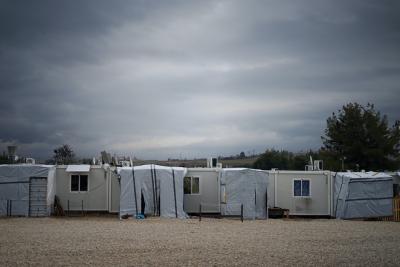Impact of Covid-19 on Refugee Camps in Greece
In this first post in our new series by our students who are back to working remotely while the University remains closed, Ariadne explores some of the impacts of the pandemic on education for children in refugee camps in Greece.
Posted:
Time to read:
When the first cases of Covid-19 started appearing in Greece, many, including myself, feared for the worst. The financial crisis followed by the so-called “refugee crisis”, the political instability at the borders, in addition to the reputation of the Greek people as care-free partying rule-breakers, all pointed to a social and medical catastrophe. It is with great relief that Greece managed to maintain low infection and death rates since the first outbreak.
As a response to the strict covid-19 regulations, the government launched an overdue mass-digitalisation of social services, including education. Although well-intentioned and arguably necessary, virtual teaching forged a massive gap between children attending private schools and state schools, children in urban and rural locations, privileged and underprivileged. Most importantly, it created significant disadvantages for children in Open Accommodation Facilities (OAFs), commonly known as refugee camps.
Underage ‘asylum seekers, recognised refugees, or beneficiaries of subsidiary protection’ technically have access to the Greek national education system. This access has taken various shapes. Nurseries and pre-school structures were built and operate within multiple refugee camps. For children over the age of six, afternoon preparatory classes are organised, offering Greek as a second language, English language, mathematics, sports, arts and computer science. In some urban OAFs, children were enrolled and have been attending local schools amongst Greek children. However, all OAFs do not offer the same provisions. For instance, state initiatives for education are largely inaccessible to children housed in camps on islands.

The imposition of a national lockdown and shift towards virtual education led to young asylum seekers and refugees being detached from the ‘outside’ world they might have interacted with for years. A coalition of educators composed an open letter to condemn the difficulties faced by children in OAFs. They highlighted that due to lack of access or inadequate WiFi and appropriate devices (laptops, tablets or phones), children in OAFs have been disproportionally unable to attend school.
Having used Zoom and Microsoft Teams for nearly a year, I am well aware that video calls are a window into other people’s lives; room décor and the occasional appearance of a pet offer welcome distractions. However, it is easy to imagine that for a child who lives in an overcrowded container box, showing their home to classmates and teachers may be uncomfortable.
On Monday 11th of January, primary schools reopened, and thousands of – Greek – children returned to face-to-face teaching. Nevertheless, for those in OAFs the reopening of schools did not necessarily mean that education resumed. For children who had not registered or did not attend virtual education since September, entering school in the middle of the year will be challenging. Moreover, the reduced public transport due to Covid-19 means that a large number of children in rural OAFs have no means to return to face-to-face education. Finally, nurseries and pre-school structures within refugee camps have yet to open, consequently, most children under the age of six-years-old have not engaged with formal educators for nearly a year.
Members of the ‘Educators’ initiative for the “right to school” for children of refugees and immigrants’ claim that the Covid-19 pandemic has normalised the exclusion and ghettoization of underage refugees and asylums seekers. As opposed to the “success story” of the government’s reaction to the global pandemic, the worrying consequences of disrupted education on young people in OAFs has not been discussed in the Greek or international mainstream media.
OAFs house thousands of people, often in inhumane conditions, who cannot leave Greece for the foreseeable future, despite many of them wishing to reach Germany amongst other destinations. The line between detainees and residents has arguably been blurry in some OAFs. Before the Covid-19 pandemic, refugees and asylum seekers could move between OAFs and the outside world with little to no constrains (this is not the case in Reception and Identification Centres on islands that are considered to be ‘hotspot’ facilities and have been reported to operate in more restrictive regimes). Many, especially those in urban OAFs, have lived in their refugee camps for years creating microcosms. However, the lockdowns and tight restrictions since March 2020 have cut OAF residents off from the outside world, reducing their agency, freedom of movement, and access to education. If it was not before, it is now clear that people residing in refugee camps are detainees. Freedom of movement and access to education are luxuries that were sacrificed pre-emptively for a longer period of time and in a stricter way than for any other population in Greece. The camp-like structure of OAFs facilitated the forced restriction of movement prior to any outbreak. Similar strictly policed lockdowns were only imposed in villages and rural areas in which outbreaks were deemed uncontrollable.
In the name of public health and security, the government was quick to impose disproportionate restrictions on a vulnerable population, while not doing enough to ensure their access to basic rights such as continued education. Yet, it is worth mentioning that navigating a financial and refugee crisis, the growing political instability at the borders and now a global pandemic is a colossal task for a small country.
The tensions arising from over-policing, years of overcrowding, and inhumane living conditions were fuelled by the strict Covid-19 government-imposed restrictions and led to the devastating fire in the Moria camp which left 13,000 people homeless. I could not write a blog post about the impact of Covid-19 on refugees and asylum seekers in Greece without mentioning this ‘preventable tragedy’.
By Ariadne Fischer, an MSc student at the Centre for Criminology in Oxford. Ariadne tweets @FischerAriadne
Share:
